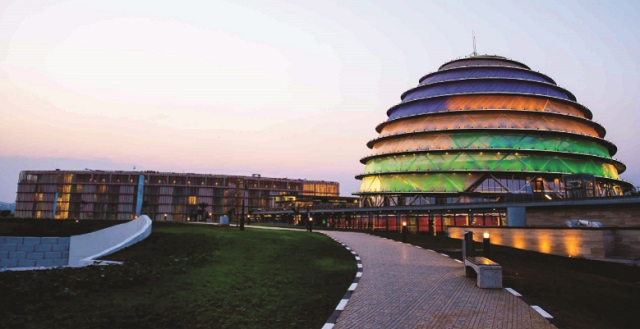
My first impressions of Kigali, Rwanda’s capital, largely agreed with the ‘Singapore of Africa’ analogies I’ve heard and read about. Things are efficient, orderly and extremely clean.
Rwanda | Jaco Maritz | The difference between Rwanda and some other East African countries can be likened to removing yellow-tinted sunglasses after having worn them for a while – the world just looks different when it’s not covered in a layer of dust.
Kigali’s cleanliness can be attributed to a combination of factors, including people generally not littering, having enough street sweepers to clean up after those who do, a ban on plastic bags, and the fact that, on the last Saturday morning of each month, it is compulsory for Rwandans to come together and clean their neighbourhoods. This community work forms part of a government-led effort to build a shared national identity, and to boost economic and social development.
I was in town to attend the Afreximbank (short for African Export-Import Bank) annual general meeting, held at the impressive new Kigali Convention Centre. The event brought together prominent African government and business leaders, such as Paul Kagame, Olusegun Obasanjo, Tony Elumelu and Aliko Dangote.
In recent years, Rwanda has transformed itself into one of the region’s most business-friendly destinations. It is second in Africa (56th globally) in the World Bank’s ease of doing business rankings, and is the continent’s third-most competitive economy, according to the World Economic Forum’s Global Competitiveness Index. Its economy has also grown rapidly, expanding by an average annual rate of 7.6% between 2007 and 2016.
But despite its reforms, Rwanda has a number of drawbacks: a small population of about 12 million, few natural resources, and no seaport. While the fact that Kigali is safe with relatively little congestion is great for jogging or driving to work, it doesn’t exactly leave one with the sense that there is a massive market of under-served consumers the same way that Addis Ababa or Lagos does. This raises the question: Why Rwanda? What opportunities are there for business to leverage the country’s welcoming environment?
One of sessions at the conference aimed to provide some answers. It featured public and private sector representatives, who discussed business opportunities in priority areas such as the knowledge economy and information and communications technology (ICT), financial innovation, light manufacturing, and intra-regional trade. Here are some of the discussion’s main takeaways.
Knowledge economy and ICT: An African tech hub
The knowledge economy is central to Rwanda’s growth plans. For instance, the government’s goal is to attract US$1 billion worth of ICT investments by 2020. It is targeting technology-enabled companies operating in a variety of industries, from fintech and smart energy grid development to agritech and business process outsourcing.
“Rwanda has been a pioneer in laying countrywide broadband infrastructure, and internet is now available throughout the country, with 4G covering 90% of the entire country. That enables us to provide the highways that are needed for serious business and opportunities for e-commerce and ICT-related businesses,” said Emmanuel Hategeka, chief operating officer of the Rwanda Development Board, an agency responsible for enabling private sector growth.
Personally, I had no issues connecting to the internet in Rwanda, with wifi available virtually everywhere. Even the taxi driver who transported me around most of the week offered internet connectivity in his car.
Kigali Innovation City (KIC) – located in a special economic zone (SEZ) – is one of the ways in which Rwanda plans to attract the world’s top technology companies. KIC is positioning itself to be a hub for tech companies and higher education institutions.
Carnegie Mellon University (CMU) Africa, one of KIC’s anchor tenants, is expected to open its new campus next year. CMU Africa, a branch of the Pittsburgh tertiary institution, offers two master’s programmes in Rwanda: one in information technology and the other in electrical and computer engineering. The African Institute for Mathematical Sciences (AIMS) and the African Leadership University (ALU), founded by well-known businessman Fred Swaniker, are also expected to operate from KIC. It will furthermore host the Rwanda Innovation Fund, a partnership between the government and the private sector developed to support growth-stage companies.
“What’s distinctive about [KIC] in comparison to other tech cities or other tech hubs that are coming up across the continent, is the deliberate focus on high-quality human capital development,” said Crystal Rugege-Ntore, director of business strategy and operations at CMU Africa.
“Our institution is quite young, but we have students from 11 different countries. I know that AIMS, as well as ALU, have similar models that bring talent from across the continent. So I see Kigali really becoming the centre of high-quality technical talent to really accelerate this ICT agenda,” she added.
Financial innovation: Banking on Rwanda’s growth
Innovation is also critical for the financial services industry to remain relevant, and Rwanda has been involved in initiatives to modernise its banking system. For instance, both Visa and Mastercard have formed partnerships with Rwandese entities to offer electronic financial payments.
 The Independent Uganda: You get the Truth we Pay the Price
The Independent Uganda: You get the Truth we Pay the Price





